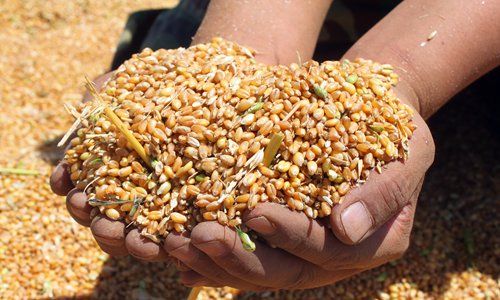HOME >> CHINA
White Paper expounds on food security, global supply
By Huang Ge Source:Global Times Published: 2019/10/15 0:23:39

Photo: IC
China on Monday issued a white paper on its efforts to improve food safety and expand global cooperation, which experts said showed the country's determination and confidence to guarantee food supply and security.
The white paper, titled "Food Security in China," was the second white paper on food issue released by the Chinese government since the first one on grain was released in 1996.
The white paper came on the 70th anniversary of the founding of the People's Republic of China.
In the past 70 years, great changes have taken place in China, but the importance of food security has never changed, Zhang Wufeng, head of the National Food and Strategic Reserves Administration (NFSRA), said at a press conference in Beijing.
Zhang noted that the Chinese government has been making sure that "the bowls of the Chinese must rest soundly in our own hands."
The white paper elaborated on China's food security, which is important to explain China's stance and policy on the issue and improve understanding on China's food safety, experts noted.
The 1996 white paper on China's grain issues was aimed at answering the question, "who will feed China?" And after more than 20 years, facts prove that the country has fulfilled its promise, Li Guanglu, an expert at a committee on national food security policy under the NFSRA, told the Global Times on Monday.
China has basically achieved self-sufficiency in grain supply. In 2018, China's grain output reached 610 million tons, accounting for more than 90 percent of the total food output, an increase of 160 million tons since 1996, the white paper said.
China's per capita share of food remains above the world average. China's per capita food possession stands at about 470 kilograms, an increase of 14 percent from 1996 and 126 percent in 1949, higher than the global average, the white paper noted.
China is able to guarantee its food supply, including provisions or forage, thanks to the country's relatively strong production ability and ample, qualified and safe reserves, said Su Wei, an official at the National Development and Reform Commission (NDRC), China's top economic planner.
Food security is essential in people's daily lives and China has attached great importance to this, as the newly released white paper unveiled the achievements and prospects of China's efforts, which helps dispel some Chinese concerns, Li said.
In the past 70 years, China's food market had seen continuous changes in consumer demand, grain structure and food quality, said Jiang Changyun, a research fellow at the Chinese Academy of Macroeconomic Research, a government think tank.
With the steady improvement of China's comprehensive grain production capacity, domestic consumers' needs have shifted from "having enough food" to "having quality food," Li said.
As to changes in food structure, corn, the third-largest grain crop in terms of production has become the largest in recent years, while rice has become the second largest in the country, Jiang said, noting the changes can be reflected in Chinese people's pursuit of qualified food.
Global cooperation
Chinese officials said at the press conference that rice and wheat can become self-sufficient in China as there is a surplus in production and demand of these two types of grains. China's imports of some grain, such as soybean, aim to "adjust deficiency of varieties," said Su.
China's soybean demand is more than 100 million tons per year and more than 80 percent of the market supply is imported, China Economic Net reported on Monday, citing expert Li Jun from China Agricultural University.
China's soybean supply has long been dependent on imports, and this will continue in the future, Li Guoxiang, a research fellow at the Chinese Academy of Social Sciences, told the Global Times on Monday.
The ongoing trade war initiated by the US will not affect China's supply of soybean as China has increased efforts to diversify import sources from the likes of Brazil and Russia, Li said, noting that some domestic efforts would likely help.
For instance, China is moving to improve the yield of soybean, to achieve a 9.3 million hectare plantation area by 2020, with an average output of 2,025 kilograms per hectare, according to the NDRC.
To drive the sustainable development of China's food market and increase global cooperation, the country is expected to further deepen agricultural supply-side reform by lowering production costs and improving infrastructure, Jiang told the Global Times on Monday.
China's food market emphasizes wider opening-up as foreign companies are grabbing a greater share in edible vegetable oil and grain processing, the white paper said.
China will continue to participate in global cooperation in food security by investing in countries and regions that have such needs, and promote technology and experience in food production, processing, storage, logistics and trade, Su said.
Since 2013, China has advanced cooperation in the food industry with countries and regions along the Belt and Road Initiative routes, Su said.
Posted in: SOCIETY